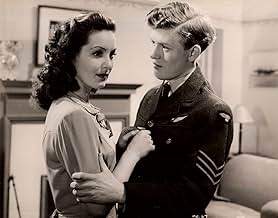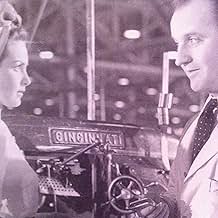A young woman called into service at a factory during World War II falls in love with a member of the RAF.A young woman called into service at a factory during World War II falls in love with a member of the RAF.A young woman called into service at a factory during World War II falls in love with a member of the RAF.
- Mrs. Blythe
- (as Amy Vaness)
- Mrs. Hammond
- (uncredited)
- Brenda - Worker at the Factory
- (uncredited)
- Directors
- Writers
- All cast & crew
- Production, box office & more at IMDbPro
Storyline
Did you know
- TriviaGrandpa Jim comments that his daughter Phyllis has progressed from dating "local lads" to "the United Nations." Interestingly, although the international organization with that name did not exist until two years after the film's release, the term "United Nations' was used to describe the allied forces arrayed against the Axis Powers. FDR used the term frequently.
- GoofsAlthough Fred Blake (Gordon Jackson) is flight crew on a Short Stirling (the type of aircraft Celia makes parts for and which is seen being towed out of the factory), there are at least two shots of Fred's aircraft taking off/climbing which are actually an Avro Lancaster.
- Quotes
Charlie: You can't cook or sew, I doubt if you can even knit. You know nothing about life, not what I call life. You're still only a moderate hand on a milling machine and if you had to fend for yourself in the midst of plenty you'd die of starvation. Those are only your bad points. I'm not saying you haven't got any good ones.
Jennifer: You're mighty generous Mr Forbes. As for you, you've no looks, you're old fashioned, morbidly suspicious, dull, and your pipe makes horrible bubbly noises.
- Crazy creditsOpening credits --- over archive footage: NOTE: The orange is a spherical pulpish fruit of reddish-yellow color.
- ConnectionsFeatured in The Unforgettable Gordon Jackson (2012)
- SoundtracksSymphony No. 5 in C minor, Op. 67
(uncredited)
Music by Ludwig van Beethoven
Played over main titles and later in the score
On the American home-front, my mother freshly graduated from Benjamin Franklin High School in Rochester, worked in the Bausch&Lomb factory, making all kinds of optical lenses for war production as that was all Bausch&Lomb was doing in 1943 when this film was made. Before that she worked after school there part time. Still it was a voluntary thing because she had a brother in the service. It was hardly the regimented lives you see these women leading, moved to far away location with new factories springing up in the country to avoid bombing. There's a reference in the film to Mr. Bevin's manpower needs filled by women and they are referring to Ernest Bevin, trade union leader, Labor MP, and in charge in the wartime Coalition Cabinet of such mobilization.
The film centers primarily around two women, Patricia Roc and Anne Crawford, two of the loveliest beauties ever to grace the screen for the UK. Both are transplanted from the city, Roc is one of three sisters living with their widowed father Moore Marriott who's a member of the Home Guard. She has a bittersweet romance with RAF sergeant young Gordon Jackson in his first role of notice.
Anne Crawford's a sexy thing used who's been around. She's not taking to factory work at all, but in spite of herself and in spite of himself, she's taking nicely to factory foreman Eric Portman and he, her.
Roc is best remembered by Americans in her one and only Hollywood film, the western Canyon Passage. And Crawford before she died tragically at the age of 36 made her mark across the pond as Morgan LeFay in Knights of the Round Table with Robert Taylor and Ava Gardner. Anne didn't yield an inch to Ava in the beauty department.
Today's audience will have it driven home just how much danger of invasion the United Kingdom was in when they see the direction signs on roads cut down and painted over. The better for the enemy not to be helped should he land.
This film is a historic classic, a must for today's audience to learn what and how much a free people might endure to stay free. Women like Roc and Crawford and the Millions Like {Us} them kept the men in the fight, kept Great Britain free and ultimately kept us all free.
- bkoganbing
- Aug 31, 2008
- Permalink
- How long is Millions Like Us?Powered by Alexa
Details
- Runtime1 hour 43 minutes
- Color
- Aspect ratio
- 1.37 : 1
Contribute to this page



































